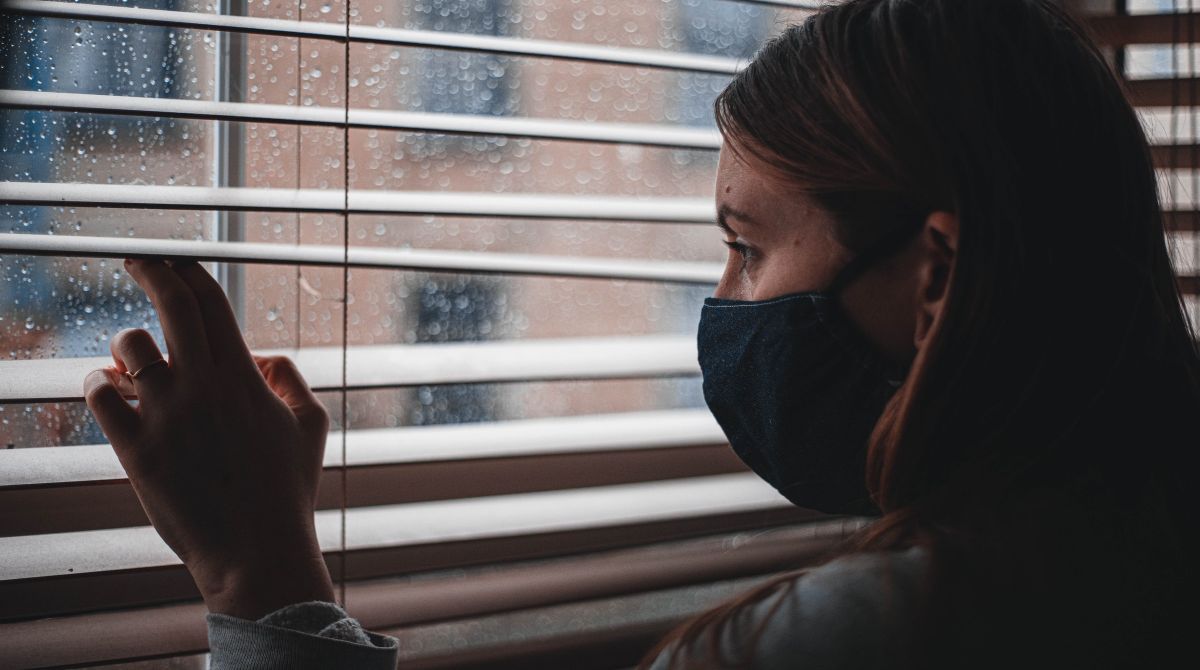Covid-19 anxiety syndrome may prevent people from returning to normal living after pandemic, new research involving Kingston University expert finds
Posted Wednesday 5 May 2021
 Younger people, or those who had underlying chronic health conditions, were most likely to suffer from heightened anxiety about the Covid-19 virus and returning to normal daily life, according to the survey of 286 people.
Younger people, or those who had underlying chronic health conditions, were most likely to suffer from heightened anxiety about the Covid-19 virus and returning to normal daily life, according to the survey of 286 people.
‘Covid-19 anxiety syndrome' may cause a significant number of people to struggle with a return to normal daily life in the UK after the pandemic, new research by Kingston University and London South Bank University has revealed.
A survey conducted by the research team found that one in five of the 286 UK-based participants scored highly on a Covid-19 Anxiety Syndrome Scale used by the researchers in February this year.
Younger people, or those who had underlying chronic health conditions, were most likely to suffer from heightened anxiety about the virus regardless of gender or vaccination status, according to the survey results.
Covid-19 anxiety syndrome is defined as worrying about catching the virus or about loved ones catching it and having coping behaviours that include excessive avoidance of certain situations, frequent symptom checking and attention to threat (for example, if others are displaying symptoms of the virus).
Professor Ana Nikcevic, Professor of Psychology at Kingston University's Faculty of Business and Social Sciences, collaborated on the research with Professor Marcantonio Spada and Professor Ian Albery, based at the Centre for Addictive Behaviours at London South Bank University.
Among the key findings were that:
• 54 per cent of participants strongly endorsed avoiding public transport because of a fear of contracting the virus.
• 49 per cent strongly endorsed avoiding touching things in public spaces because of a fear of the virus.
• 38 per cent strongly endorsed avoiding going out to public places because of a fear of the virus.
• 14 per cent strongly endorsed paying close attention to others displaying possible symptoms of the virus.
• 9 per cent strongly endorsed reading about the news relating to the virus at the cost of work engagement.
The top 25 per cent of scorers on the Covid-19 Anxiety Syndrome Scale were found to be younger or have underlying conditions which put them at increased risk. These conditions included diabetes, asthma, and other chronic health problems.
This research alongside other psychological research has found that younger people have experienced more psychological distress during the pandemic compared with older people, Professor Nikcevic said.
 Prof Ana Nikcevic said while most people will be able to reintegrate into society, more research is needed on those who find this difficult.
Prof Ana Nikcevic said while most people will be able to reintegrate into society, more research is needed on those who find this difficult.
"The reasons behind this are complex and require further research," she said. "One contributing reason may be that young people's routines were more severely impacted by the lockdown and associated measures.
"Another explanation may be that younger people have greater exposure to social media and other news sources about Covid-19 which might increase feelings of anxiety."
The findings also showed that how people coped with the fear of contracting the virus was important to their psychological state, Professor Marcantonio Spada, Professor of Addictive Behaviours and Mental Health at London South Bank University, said.
"Our research highlights that some forms of coping may exacerbate this fear and heighten anxiety," he said.
"We observed that the higher the levels of Covid-19 anxiety syndrome, the more likely it is that those people will be aware of the threat of catching the virus. This group of people also find it harder to disengage from these threats, which may make a return to normal daily living harder."
Clinicians can help by encouraging people to try to reduce the frequency of worrying about the virus or checking for symptoms.
"With such a successful vaccination programme in place, it is now safer for all of us to start reintegrating. The pandemic's ‘prescribed' behaviours that originally kept us safe, such as avoidance of public places, need to be gradually discontinued," Professor Nikcevic added.
"We would expect that most people will be able to reintegrate in time. Further research is needed to understand how large the minority of people who continue to find this difficult will be as UK society returns to normal."
• Read more about COVID-19 anxiety syndrome scale here.
• The research data was collected from a UK national sample of 286 survey respondents in February 2021. The sample was equally split between the genders with an average age of 46 years.
Contact us
General enquiries:
Journalists only:
- Communications team
Tel: +44 (0)20 8417 3034
Email us



